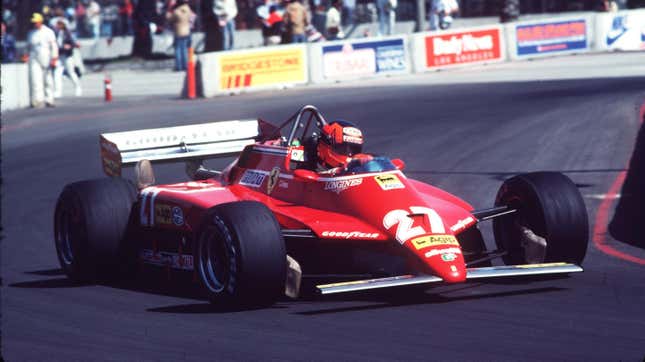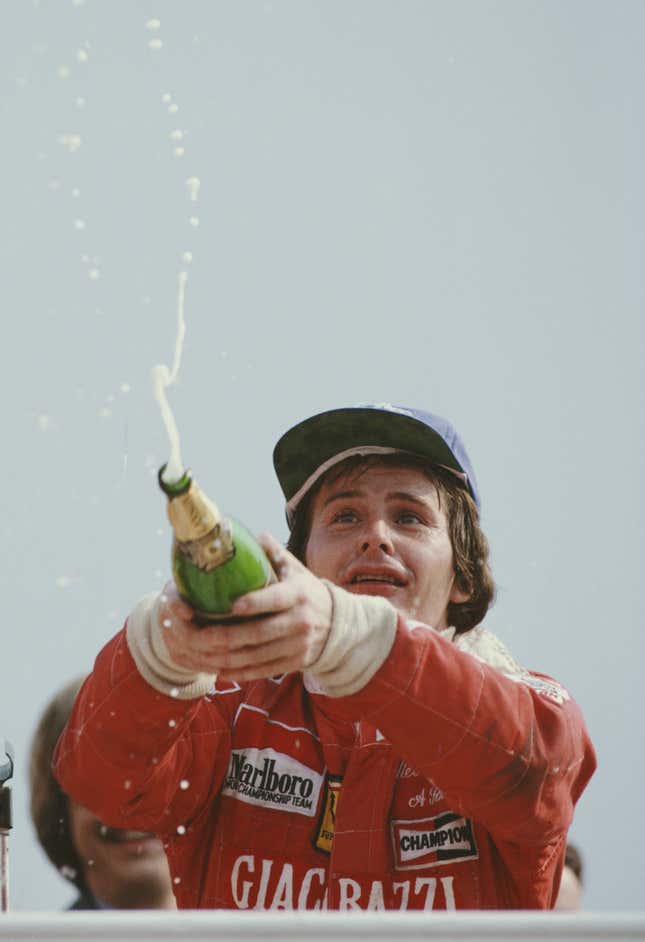
By all accounts, Gilles Villeneuve was one of the most impressive Canadian drivers to ever compete in Formula One and promised a slew of championships, if only Ferrari could develop a consistent car. But his potential was cut short. On May 8, 1982, Villeneuve was killed in a crash during qualifying for the Belgian Grand Prix at Zolder. He was 32 years old.
(Welcome to Today in History, the series where we dive into important historical events that have had a significant impact on the automotive or racing world. If you have something you’d like to see that falls on an upcoming weekend, let me know at eblackstock [at] jalopnik [dot] com.)

Born in Saint-Jean-sur-Richelieu, Quebec on January 18, 1950, Joseph Gilles Henri Villeneuve made the bulk of his early racing money by competing on snowmobiles—something that he credited with later helping him race Formula One cars in the rain. With a tight budget, it took Villeneuve longer to ascend the ranks of racing into F1 than most; he was 27 when he made his debut but claimed to be 25 in order to assuage any concerns about his ‘old’ age.
His skill, even then, was unmatched. James Hunt was so impressed at Villeneuve beating him and other F1 racers in a non-championship Formula Atlantic race at Trois-Rivières that Hunt’s McLaren team offered Villeneuve a few races in its third car for the 1977 season. In his first race at the British Grand Prix, Villeneuve set the fifth fastest lap overall and finished 11th despite being held up for two laps due to a faulty temperature gauge. He joined up with Ferrari for the final two races, in which he got caught up in a crash that killed a spectator. McLaren decided not to continue with Villeneuve.
He joined Ferrari full time in 1978 after Niki Lauda retired, but Villeneuve didn’t finish four of the first five races, largely due to issues with Michelin’s radial tires. But once he found his footing, Villeneuve managed to prove his competence, eventually scoring his first F1 win at the Canadian Grand Prix.
During his career, Villeneuve racked up six F1 race wins. His best overall championship finish was second. Those stats fail to illuminate the on-edge driving style he was known for and the personality that endeared him to many drivers on the grid. Villeneuve had ascended to icon status in the F1 world when, on May 8, 1982, he collided with Jochen Mass during qualifying for the Belgian Grand Prix.
Mass had slowed and moved out of the racing line to let the faster Ferrari by, but Villeneuve had already decided to try to pass Mass. The two collided at over 120 mph. Villeneuve’s Ferrari launched into the air. His body, still strapped to his seat, left the chassis. He died at the hospital later that night.
Gilles Villeneuve was one of those drivers about whom drivers couldn’t stop talking, even prior to his death. Jackie Stewart praised Villeneuve as having “extraordinary” car control, noting that Villeneuve “drove a Grand Prix car to the absolute limit of its ability.” Niki Lauda called him the “perfect racing driver” and “the best talent of us all.” Jacques Lafitte mused that, “I know no human being can do miracles, but Gilles could really surprise us sometimes.” When he learned of Villeneuve’s death, René Arnoux felt that “we were all starting equal from now. Villeneuve was gone. We all knew he had talent beyond our reach.”
With Villeneuve’s death, journalist Alan Henry noted that “a certain approach” to racing also died. Henry pegs Villeneuve as the last driver who raced for pure joy, whose experience was unmuddled by the need for technical precision, the most money, or the best business sense. And that is part of why Villeneuve has remained an icon, even decades after his passing.
Salut, Gilles.